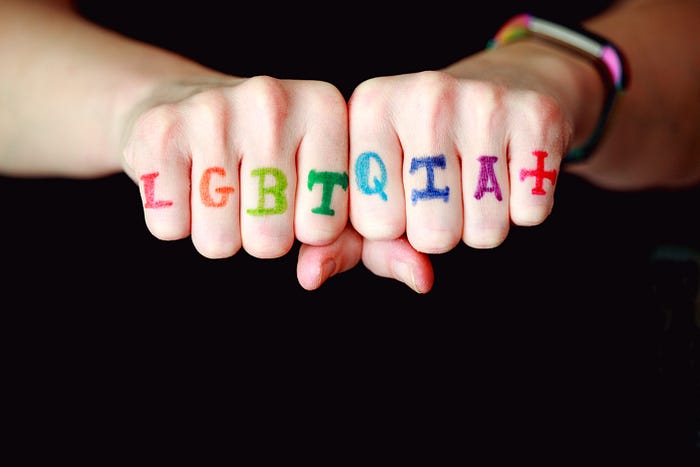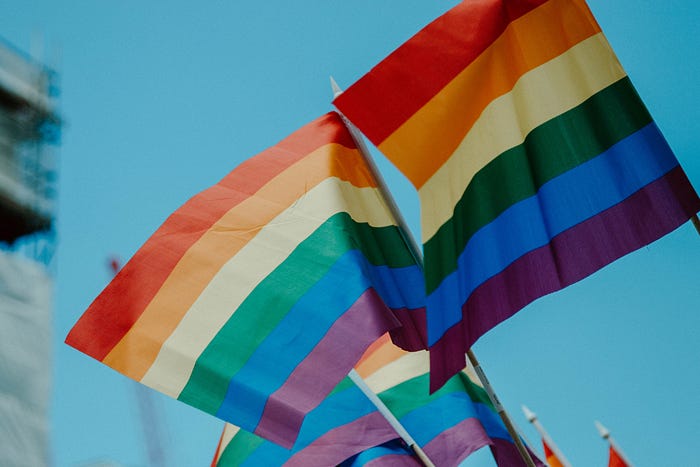

When Queer Isn’t Queer Enough
source link: https://heidisamiam.medium.com/when-queer-isnt-queer-enough-9374142ded86
Go to the source link to view the article. You can view the picture content, updated content and better typesetting reading experience. If the link is broken, please click the button below to view the snapshot at that time.
When Queer Isn’t Queer Enough

Photo by Sharon McCutcheon on Unsplash
I have mixed feelings every June.
And at every pride parade I’ve ever attended.
Because I don’t fit neatly into one of the first four letters.
I can fit myself approximately into pre-existing microlabels — the ones that many people roll their eyes at — but even those distinctions, those nuances, aren’t entirely helpful to me. There are a lot of ways to exist in relation to others and in social categories like gender, but I don’t feel fully comfortable with any label except “queer.”
Of course, a lot of people also take issue with the “Q” and with those of us who use the word to describe ourselves. Because “queer” is not well-defined enough for people who like to discriminate or for people who like to gatekeep. It makes people uncomfortable when they can’t immediately file something into a clear category with specific and well-known boundaries (which isn’t to say, of course, that the well-defined categories don’t also make people uncomfortable).
You can’t hate me as easily if you can’t point to why you hate me. You can’t exclude me as easily if you can’t point to why I’m not welcome. And I think that’s partly why the word fits me so well.
The way I exist cannot be simply or satisfactorily explained to other people. I never feel understood when I tell people that I don’t have pronouns because I don’t strongly identify with gender as a concept at all. Or that I’ve never wanted to get married and prefer to spend most of my time alone. Or that all the categories of attraction people use to explain how they relate to others just don’t map onto my experience of people or of sex or of my own feelings.
People often just don’t believe me. As if the only way for something to be real is if we can pin a specific word onto it or if it fits within a narrow set of rules. Surely I must be something. I must be a woman because of how my body is shaped or because I keep my hair long. I must have a distinct sexual orientation because I’ve been in partnered relationships in the past (never mind that they weren’t good for me).
Even people whose microlabels come close to the ones I would choose for myself (if I ever had to) have widely different experiences from mine.
Part of me does find some comfort in the fact that there is such a variety of human experiences, even within the rigid social categories we’re forced to structure our lives within — boxes we have to check, milestones we’re supposed to hit, words we must use. But when it comes down to it, I don’t know how to explain myself in any other way than that I’m queer.
I know “queer” is a reclaimed slur. I know it still hurts some people to hear it. I know I’m slightly too young to have a strong negative reaction to it, because my first real association with the word was through queer theory. I know trans-exclusionary radical feminists (TERFs) use its history as a slur as a talking point to push their anti-trans, sex-as-a-binary agenda. I know some people like that it feels like an inclusive umbrella term. I know others prefer more specificity in the terms they use to describe themselves.
I don’t see “queer” as an umbrella I fit under so much as I see it as a rejection of demographic categorization at all, a rejection of other people trying to tell me about myself as if I am not the expert of my own lived experience. I see “queer” the way the Dog Park Dissidents do.

Photo by daniel james on Unsplash
But it doesn’t feel great every June when I see other people rallying around their more specific identities, the other letters, their flags, because I know I don’t quite fit with any of them.
When I hear the word “community” used in association with the rest of the abbreviation, I don’t believe that really includes me. When the way you live in and interact with the world involves being alone, when the way you connect with other people isn’t through attraction in any specific sense, it’s hard to feel a sense of connection, let alone community, at all.
And even though pride, like everything else, has been hijacked by profit seekers and reduced to a single event rather than a long, multifaceted, and ongoing fight, there is still something meaningful to recognize, to honor, to fight for, especially now with the world as it is.
But even though I am here, and I am queer, I still have to feel pride for other people instead of myself.
Because there isn’t anyone to get used to me as I am.
Recommend
About Joyk
Aggregate valuable and interesting links.
Joyk means Joy of geeK